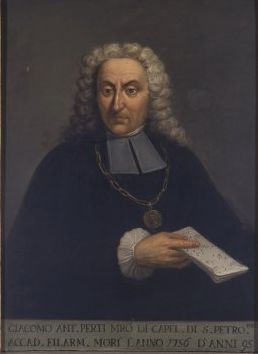Giacomo Antonio Perti facts for kids
Giacomo Antonio Perti (born June 6, 1661 – died April 10, 1756) was an Italian composer. He lived during the Baroque period, which was a time when music became very grand and expressive. Perti spent most of his life in Bologna, Italy. There, he worked for sixty years as the Maestro di Cappella. This means he was the main music director for a church. He also taught other famous musicians, like Giuseppe Torelli and Giovanni Battista Martini.
A Musician's Life
Giacomo Antonio Perti was born in Bologna, a city that was part of the Papal States at the time. He started learning music when he was very young. He learned to play the harpsichord and the violin. Later, he studied counterpoint, which is a way of combining different melodies to make them sound good together.
By the time he was just 17 years old, Perti had already written several pieces of music. These included a mass (a type of church service music), a motet (a short religious song), and a setting of the Magnificat (a Christian hymn). In 1678, he wrote his first opera (a play set to music) and oratorio (a large musical story, usually religious, performed without costumes or staging).
Perti traveled to other cities like Parma and Venice. In Parma, he studied with Giuseppe Corsi da Celano. This helped him develop his unique style for sacred (religious) music. Many of his psalm settings from the 1680s and 1690s show Corsi's influence.
In 1690, Perti got an important job. He became the Maestro di Cappella at S Pietro church in Bologna. He took over from his uncle, Lorenzo Perti. Then, in 1696, he became the Maestro di Cappella at another important church in Bologna, S. Petronio. He stayed in this role for exactly sixty years, until he passed away at the age of 95.
Perti wrote a lot of music, especially operas and sacred pieces. He was highly respected by other composers, as well as by important people like princes and emperors. Even famous rulers like Emperor Leopold I and Emperor Charles VI admired his work.
Perti's Musical Works
Perti was very well-known for his sacred music and his operas. He wrote 26 operas in total, but only a few of them still exist today. Perti said that his early operas were influenced by other composers like Francesco Cavalli and Antonio Cesti. However, Perti was also very original. He used different instruments in new ways and created interesting dialogues and countermelodies (extra melodies that go along with the main one).
His religious music was even more impressive. He wrote 120 settings of psalms, which are songs from the Bible. These pieces were for one voice, a choir, and various instruments. He also composed 54 motets, 28 masses, and many other church works.
Perti also wrote music that wasn't religious. This included 142 solo cantatas. Cantatas were popular songs for a single singer in Italy during the late 1600s. He also wrote some instrumental music, like sonatas and sinfonias, for different instruments.
Operas by Perti
Perti wrote many operas during his career. Here are some of them:
- Marzio Coriolano, 1683
- Oreste in Argo, 1685
- L'incoronazione di Dario, 1686
- La Flavia, 1686
- La Rosaura, 1689
- Dionisio Siracusano, 1689
- Brenno in Efeso, 1690
- L'inganno scoperto per vendetta, 1691
- Il Pompeo, 1691
- Furio Camillo, 1692
- Nerone fatto cesare, 1693
- La forza della virtù, 1694
- Laodicea e Berenice, 1695
- Penelope la casta, 1696
- Fausta restituita all'impero, 1697
- Apollo geloso, 1698
- Lucio Vero, 1700
- Astianatte, 1701
- Dionisio re di Portogallo, 1707
- Il Venceslao, ossia Il fraticida innocente, 1708
- Ginevra principessa di Scozia, 1708
- Berenice regina d'Egitto, 1709
- Demetrio, 1709
- Rodelinda regina de' Longobardi, 1710
- Un prologo per il cortegiano, 1739
Oratorios by Perti
Perti also composed many oratorios, which are like operas but without acting or costumes. They usually tell a religious story. Here are some of his oratorios:
- Due gigli porporati nel martirio di santa Serafia e santa Sabina, Bologna, 1679
- Abramo vincitor de' propri affetti, Bologna, 1683
- Il Mosè conduttor del popolo ebreo, Modena, 1685
- Oratorio della Passione, Bologna, 1685
- La beata Imelda Lambertini bolognese, Bologna, 1686
- San Galgano Guidotti, Bologna, 1694
- La Passione di Cristo, Bologna, 1694
- Christo al Limbo, Bologna, 1698
- La sepoltura di Cristo, Bologna, 1704
- San Petronio, Bologna, 1720
- La Passione del Redentore, Bologna, 1721
- I conforti di Maria Vergine addolorata per la morte del suo divin Figliuolo, Bologna, 1723
- Il figlio prodigo, undated
- Oratorio della nascita del Signore, undated
- San Francesco, undated
- La sepoltura di Cristo, undated
See also
 In Spanish: Giacomo Antonio Perti para niños
In Spanish: Giacomo Antonio Perti para niños
 | Jackie Robinson |
 | Jack Johnson |
 | Althea Gibson |
 | Arthur Ashe |
 | Muhammad Ali |


